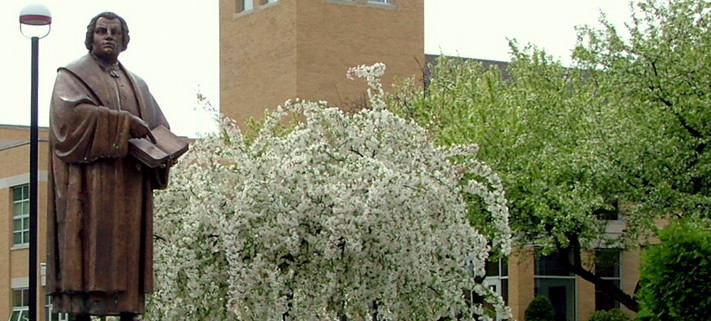Run to get the prize
These excerpts come from Lisa’s blog during her last years on this earth. They are her words. She is now with the Lord in her heavenly home.
Lisa Rittierodt
I was diagnosed with ovarian cancer six years ago. I was only 39 at the time. I’m still fighting this disease. On my three-year anniversary, I decided that I wanted to start a blog to show others how it has been possible to walk with cancer all this time. It is because God is walking with me.
MY RACE IS ALMOST RUN
Running has never been a favorite pastime of mine. I remember having to run a mile every day in my grade school. Even during basketball season I could never run the entire mile without stopping. The distance was always too long. Now it seems that a lengthy earthly race will also be too long for me.
My oncologist confirmed what Paul and I have been suspecting for the last week. I am out of options. They said it was up to me to keep trying different treatments that would be toxic in hopes to extend my life or do something else that would give me a better quality of life. Either way there is no guarantee in anything.
As far as a time line, they really can’t give one. Just like with my mom, all of a sudden things will shut down, and then they can say weeks. I asked about my family reunion in July, and both my doctor and my nurse said that it’s unlikely that I will be able to travel then. They did say that it could be different in two to three months when they see how things are going. We will cross that bridge with the rest of the family when we come to it.
We told the kids on Monday. It’s not easy hearing that your mom will be going home to heaven before you are even close to being an adult. They all reacted differently but how we expected them to.
As I have been pondering the past few days, the verse my daughter Melanie chose as her confirmation verse kept running through my mind: “Do you not know that in a race all the runners run, but only one gets the prize? Run in such a way as to get the prize” (1 Corinthians 9:24).
Like I said before, I’ve never liked running. My thought of this verse reminded me of the hard, pounding running people need to do to train. And honestly, that is part of our spiritual running, isn’t it? We have to pound away, constantly learning, constantly training to keep God’s Word so embedded in our hearts that nothing can penetrate it.
But now, I’m looking at the verse like the painting Melanie’s first-grade teacher, Rachel Tacke, made for her confirmation. It’s based on 1 Corinthians 9:24. I love this because it’s a child. A child just keeps running because that’s what children do. That childlike faith knows they are going to get to the goal and the goal will be wonderful. There is no hardship, but there is urgency. There is no wondering, yet there is expectation. There is no angst, just moving forward.
So as I finish my race, I am going to be running with the childlike faith shown here. I know I am running to an amazing place. The last part of this race won’t be easy, but the reward will be amazing.
AT THE END OF THE RACE
It’s hard to believe that six years ago today I was diagnosed with ovarian cancer. Six years ago we were filled with hope that God would cure me of this disease. Six years ago we had no idea what kind of roller coaster we would be on fighting the cancer. Six years ago we were still looking forward to a long life with our family.
Now we are no longer hoping for a cure. Instead of a roller coaster of fighting a disease, we are on a roller coaster of my final days. Instead of a future as a family, I am now looking toward a future in eternity. What a difference six years can make.
I would guess that most of us would want to die peacefully in our sleep, just like the prayer:
Now I lay me down to sleep.
I pray the Lord my soul to keep.
If I should die before I wake,
I pray the Lord my soul to take.
I can’t begin to tell you how many times I’ve prayed this prayer over the past few months. There have been times I’ve even begged the Lord to let me fall asleep and wake up in his arms. I think we understand that there will be physical pain before we go home, but we have no idea the other things we will have to face in our last days.
We don’t know how many days we have left. The agony of waiting is heartwrenching. The mourning that has to happen can be physically exhausting. I never knew how much mourning I would have to go through. I mourn every time I say a last good-bye to someone. I mourn when I remember that good-bye. I mourn when I think about all the things my family will have to experience not only in my death but also in all the things that they will experience, both good and bad, without me.
I know firsthand how painful it is to be without a mom at events from confirmations to picnics in the park. It’s no wonder at times I pray, “Please let me die before I wake.”
But I think the hardest part is walking through the valley of the shadow of death. For me it has not been a short road. There have been so many ups and downs and twists and turns that it’s hard to know what to think sometimes. And let me tell you, the devil works harder in those last days than I ever thought possible. It’s his last chance to take me away from my Savior, and he is going to find every weakness I have ever felt or thought about my Savior and try to use it against me.
Yet the one thing I’ve never doubted is where I am going, and it is only by God’s mercy and grace that I have been freed from that doubt.
Through every temptation the devil has put in my way, my Shepherd has come to protect me. He has always been with me, and he will get me to my eternal home when his time is right. It might mean many more hard days ahead for me. But that won’t stop him because nothing, not even death, can stop him from getting me home to him and in his everlasting arms.
So it’s my sixth anniversary of cancer. Honestly just a few weeks ago I didn’t think I’d make it this far. To have six years with my friends and family I am extremely grateful. Now I look forward to my heaven day, where I will have the best day of my life. I can’t wait to see you all there.
See you soon,
Lisa
Lisa Rittierodt died in July 2015. Her husband, Paul, and their three children are members at Light of Life, Covington, Washington.
SUBMIT YOUR STORY
Do you have a manuscript, idea, or story from your own life you’d like to share for use in Forward in Christ or on wels.net? Use our online form to share it to our editorial office for consideration.
SUBSCRIBE TO FORWARD IN CHRIST
Get inspirational stories, spiritual help, and synod news from Forward in Christ every month. Print and digital subscriptions are available from Northwestern Publishing House.
Author: Lisa Rittierodt
Volume 103, Number 1
Issue: January 2016
Copyrighted by WELS Forward in Christ © 2021
Forward in Christ grants permission for any original article (not a reprint) to be printed for use in a WELS church, school, or organization, provided that it is distributed free and indicate Forward in Christ as the source. Images may not be reproduced except in the context of its article. Contact us













